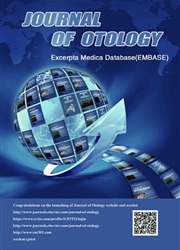

 中文摘要:
中文摘要:
目的探讨HSP60在大鼠耳蜗中的表达及硫酸卡那霉素损伤后的表达变化。方法正常成年雌性SD大鼠20只随机分为两组:对照组(生理盐水)和实验组(硫酸卡纳霉素),按500mg/kg剂量每天给药一次,连续腹腔注射21天。ABR检测听力变化;实时定量PCR和Western Blot分别检测HSP60的m RNA和蛋白表达量的变化;免疫荧光染色观察HSP60在耳蜗中的表达变化及分布。结果 ABR检测显示实验组较对照组明显升高(P〈0.05)。实时定量PCR、WesternBlot和基底膜铺片免疫荧光染色的结果显示实验组HSP60表达量降低(P〈0.05)。冰冻切片免疫荧光染色,观察到HSP60表达于Corti器上的支持细胞内。结论 HSP60表达于支持细胞,正常生理情况下即表达,慢性药物中毒性耳聋模型中表达量降低,推测HSP60可能参与了药物性耳聋的发生过程。
 英文摘要:
英文摘要:
Objective To study the expression of heat shock protein 60(HSP60) in rat cochleae and its changes in kanamycin monosulfate(KM)-induced ototoxicity. Methods Twenty adult female Sprague-Dawlay(SD) rats were randomly divided into two groups(n=10 in each) to receive intraperitoneal injection of KM(500 mg/kg qd) for twenty one days, or equivalent volume of saline(control group). ABR tests were used to detect hearing loss. The pattern and level of HSP60 expression within the cochlea were tested by real-time PCR, Western blot and immunofluorescence assays. Results ABR tests showed significantly higher thresholds in the experimental group than in the control group(P〈0.05). Real-time PCR,Western blot and basilar membrane immunofluorescence staining showed decreased expression of HSP60 in the experimental group(P〈0.05). Immunofluorescence staining of frozen cochlear sections revealed HSP60 expression in supporting cells of the organ of Corti. Conclusion HSP60 is expressed in supporting cells under normal conditions, but is decreased in rats with chronic drug-induced hearing loss. It is hence speculated that HSP60 may participate in the process of drug-induced hearing loss.
 同期刊论文项目
同期刊论文项目
 同项目期刊论文
同项目期刊论文
 期刊信息
期刊信息
